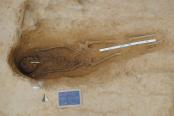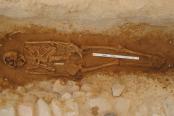CAMPAGNA 2015 |
1° SETTIMANA |
2° SETTIMANA |
3° SETTIMANA |
4° SETTIMANA |
5° SETTIMANA |
6° SETTIMANA |
30 LUGLIO 2015 
Resoconto della giornata di scavo
Area 2000
The last day of excavation for the season involved finishing up all of yesterday’s exposed skeletons. This included proper documentation, points, and photos of each skeleton and grave cut. The skeleton, USk 2389, that was under the wall separating sections A and B, was removed as much as possible. This included a complete os coxae, sacrum, a couple left carpals, and 2 lumbar vertebrae. There was clearly more of the individual underneath the wall, but it is currently not possible or reasonable to remove it all. USk 2663 was also removed, but upon its exposure, we cannot prove that it is the oldest skeleton on site because the bones were not underneath the foundation of the bell tower but merely next to it.
In preparation of closing the site, the western expansion, and sections A and B were properly cleaned and sprayed. Photos of each section were taken and tomorrow we will cover some of the sections with geotextile.
Area 3000
Nella porzione nord-orientale del Settore B è stata completata la messa in luce dell’inumato USK 3641, orientato W-E e deposto in decubito dorsale all’interno della fossa sepolcrale US – 3643. Si tratta di un individuo di sesso femminile con un’età compresa fra i 30 ed i 40 anni, complessivamente mal preservato. Il cranio, piuttosto frammentato e schiacciato verso il basso, è in apparizione laterale destra; gli arti superiori sono entrambi leggermente flessi sul pube, mentre quelli inferiori sono distesi ed in cattivo stato di conservazione. Nella porzione sud-orientale, a nord del perimetrale meridionale USM 5003, è stato messo in evidenza anche lo scheletro USK 3653, anch’esso orientato W-E e deposto supino probabilmente all’interno di una cassa lignea, come sembra mostrare l’avvenuta decomposizione del corpo in spazio vuoto. L’inumato, un maschio adulto fra i 30 ed i 40 anni, si presenta in buono stato di conservazione: il cranio è in apparizione laterale sinistra, l’arto superiore destro è disteso lungo il corpo, con il polso al di sotto del coxale, mentre quello sinistro è leggermente flesso sul pube; gli arti inferiori sono leggermente flessi verso nord ed il femore sinistro è ruotato verso l’esterno. I piedi sono convergenti e leggermente sovrapposti; la loro posizione sembra suggerire il fatto che il defunto potesse essere stato avvolto in un sudario. Più a nord è in corso la messa in luce dell’individuo USK 3652.
Area 5000
Today in area 5000, further excavations of the bell foundry continued. It was discovered that to the west, within the cross shape cut of the bell foundry, a trench extends roughly 50cm. This trench connected to the foundry is lined with the same red stained soil as the rest, and was expected as contemporaneous foundries within Europe all appear to have a similar design. Meanwhile, four holes, which formed a square, were delineated in the northeastern corner of the area. Three of these were excavated, with no significant finds. The one in the southwestern corner of the space was only outlined, as it extended too far out of the pickaxed area. A further two holes, one inside of the other, were delineated between the two on the eastern side. Once all this was completed, several members began to better expose the wall abutting area 3000 and USM 5117, while another removed a black stain from sector B. A large brick was kept for comparison with other bricks of different time periods, but no other significant finds were made. The day ended with a full cleaning of sectors A and B in preparation for the final photographs of the season.








